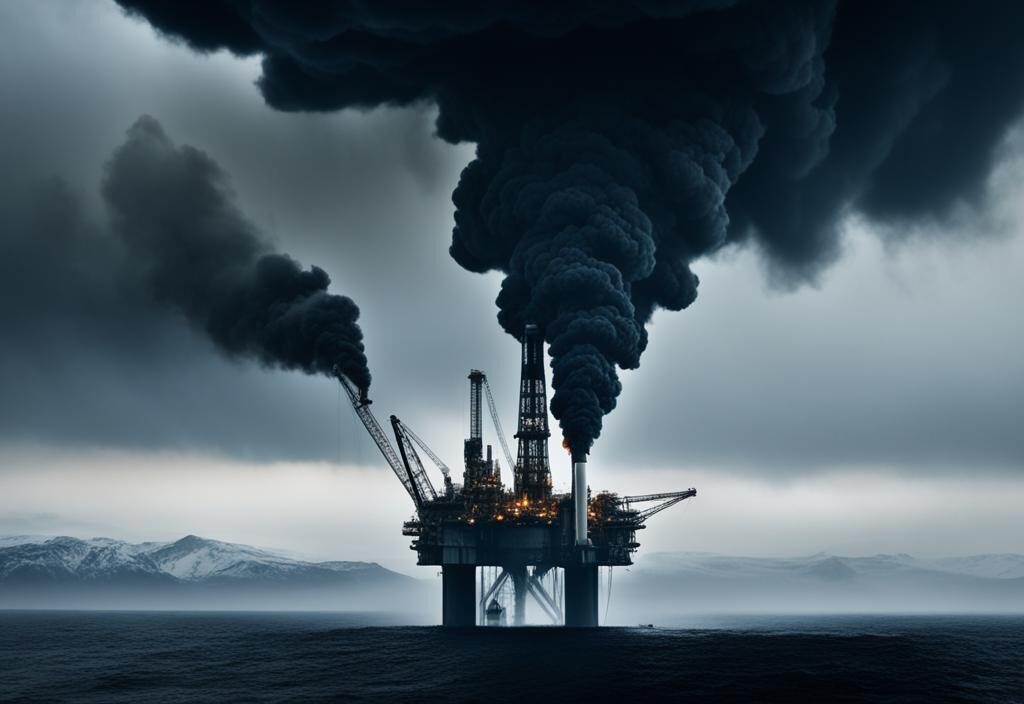Last week, Democrats in Congress shared a harsh report. It digs deep into the big oil companies’ long history of lies. This report took three years to put together. It shows how these oil giants gave the American people the wrong idea about climate change. They knew their pollution was dangerous1.
The oil industry first learned about the harms of their work in the 1960s1. Instead of being part of the solution, they chose to hide the truth. They used many tricks to make people think cutting emissions was not so urgent. They even pushed for more use of their products2.
The investigation found tons of documents and videos. These materials expose how oil companies are being two-faced. On one hand, they get $600 billion in subsidies each year32. On the other, they fight against climate laws they claim to support2.
Key Takeaways
- Fossil fuel companies have known about the climate change impacts of their products for over 60 years but have misled the public about the dangers.
- Major oil companies have collected over $600 billion in annual subsidies while making record profits and lobbying against climate policies.
- The industry has used a range of tactics to undermine climate science and promote the continued use of fossil fuels, including greenwashing and fossil fuel solutionism.
- Internal documents reveal contradictions between public statements and private acknowledgments about the feasibility of emissions reduction and net-zero goals.
- The fossil fuel industry’s deception has far-reaching consequences, and they may face legal accountability for their actions.
Revealing the Decades-Long Climate Denial Campaign
For many years, big oil companies have tried to slow down action on climate. This is well-documented4. They supported climate research in secret but spread doubt in public5. Evidence shows these companies, like ExxonMobil, misled the public about climate science6. They did this by saying one thing in private and another in public.
Major Oil Companies’ Decades of Deception
Since the 1950s, the oil industry knew about the risks of their products to the climate4. But they spread doubt, using tactics like those of the tobacco industry6. This denial campaign made many people doubt climate change is real6.
Internal Documents Expose the Truth
Recently, new documents have shown how the fossil fuel industry spreads climate misinformation5. This has caused many to call for a legal investigation, similar to the past lawsuit on tobacco companies5. Some states and cities have already taken legal action against these oil companies to hold them accountable5.
“There is an adequate foundation for building a case against the fossil fuel industry, similar to the case against the tobacco industry.”
– Sharon Eubanks, former DOJ attorney5
| Key Findings | Impact |
|---|---|
| Percentage increase in carbon emissions due to the climate denial campaign orchestrated by Big Oil over 26 years. | Undermining and delaying climate action, leading to a significant increase in global emissions. |
| Total monetary value spent by ExxonMobil on organizations involved in climate denial campaigns. | Highlighting the substantial resources dedicated to misleading the public and policymakers. |
| Number of peer-reviewed studies identifying the connection between fossil fuels and climate change that were influenced by the efforts of the climate denial campaign. | Demonstrating the widespread impact of the industry’s disinformation efforts on the scientific discourse. |
Newly revealed documents are changing how we see the fossil fuel industry’s actions against the climate5. There’s growing demand for the truth and responsibility from both the public and policymakers4. The industry’s long-term deception practices are now coming to light56.
Big Oil’s Evolving Tactics: From Denial to Disinformation
In the last couple of decades, big oil and gas companies changed how they talk about climate change. Starting from the mid-2000s, they moved from saying it wasn’t real to finding new ways to avoid taking action7. They used a tricky mix of words – just enough to say they’re talking about it but not so much that it pins the problem on them8.
The Shift from Outright Denial to Subtle Propaganda
They began talking more about consumers’ needs for energy, not openly about fossil fuels. They also started referring to climate change as a “risk” more than a big issue7. Instead of facing the problem head-on, they used other tactics like greenwashing, focusing on the idea that fossil fuels and new technologies could be the answer8.
Greenwashing and Fossil Fuel Solutionism
These major oil companies started saying they’re helping with climate change, not causing it. They pushed things like carbon capture, biofuels, and algae as the best solutions9. But, it turns out, a lot of this is just a way to avoid actually doing something about climate change8.
As more people learn about the climate crisis, oil and gas companies are changing how they try to keep their power and profits. They continue to use various misleading strategies, trying to confuse the public and leaders about the seriousness of climate change789.
“The biggest oil and gas corporations often say one thing for public consumption but act differently to protect their profits.”
– Representative Bernie Sanders8
The “Bridge Fuel” Myth: Portraying Natural Gas as Climate-Friendly
For years, the oil and gas industry has pushed for more use of fossil fuels, like natural gas. They call it a “bridge fuel” or even a safe long-term choice10. But, hidden documents show they know natural gas harms the climate as much as coal does, which doesn’t align with our needed emission cuts11.
By making natural gas sound like a “bridge fuel,” the industry has won over many people11. However, research tells a different story. It says burning gas adds enough greenhouse gases to miss our climate targets, making it a bad choice for transitioning to a greener future11.
Also, the use of Liquefied Natural Gas (LNG) in shipping is growing fast and causing worries10. In the EU, LNG use has doubled from 2018 to 202210. And, the methane gas from LNG ships has grown by 150% in recent years10. The shipping industry plans to buy hundreds more LNG-powered ships by 203010. This shows we must look into the big methane issue from these ships, a problem often overlooked by the International Maritime Organization (IMO)10.
The oil and gas sector’s push for natural gas as a green “bridge fuel” is well-documented. Studies and internal reports show the industry’s misleading claims1112. This evidence urges us to question their narrative and make sure they are responsible for how they influence public views and policies about natural gas use as a bridge fuel.
Public Pledges vs. Internal Realities: Net Zero Emissions Doublespeak
The world is facing the urgent challenge of climate change. Many oil and gas firms are promising to support the Paris Agreement. They aim to achieve net zero emissions. But, inside reports show a big gap between public promises and real efforts.
Contradictory Stances on the Paris Agreement
Big oil companies say they are behind the Paris Agreement. This is good, right? But, they are actually fighting against laws that would help meet the Agreement’s goals13. BP, for one, led a big fight in Washington. They were against rules that might have cut carbon emissions.
When these firms talk about going net zero by 2050, there’s a catch14. Places like Cornell University have said they cut emissions by 50% by using natural gas. But, they left out the big picture. Using natural gas also makes a lot of emissions.
Private Lobbying Against Climate Policies
Oil and gas companies seem to like climate action in their public speeches. But behind closed doors, they work to block real progress13. They lobby hard against laws needed to lower greenhouse gases. This hidden effort goes against what they support in the agreement.
This shady dance doesn’t stop with just a few companies. It’s a problem all across the industry14. For example, Cornell University is not clear about its impact. They don’t fully share their emissions data. Again, they miss the mark on their climate promises without telling the whole story131514.
Carbon Capture Technologies: Promises and Limitations
For years, the oil and gas industry has praised carbon capture, utilization, and storage (CCUS). They see it as key to fight climate change. Yet, digging into their messages shows a tricky outlook. They both support and doubt the power of these technologies16.
Celebrating CCUS While Acknowledging Economic Challenges
Big oil companies celebrate the advancements in CCUS publicly. But behind closed doors, they’re less optimistic. BP and others admit CCUS is a tough sell without a strong carbon tax. They say the current system, where pollution is free, makes it hard to invest in CCUS16.
Last year, the world pumped out 40.5 billion metric tonnes of CO2. This high number shows we need a fix, and fast16. But, removing CO2 from the air isn’t cheap. It costs over $1,000 per tonne. That’s a lot more than some other climate-saving methods. Some are even low cost or payback in benefits16.
The U.S. has put a lot of money into CCUS, especially through the Department of Energy. They’ve spent tens of billions on “clean coal” and carbon capture projects16. But, the successes have been limited. Most funded projects ended up failing, like the Petra Nova coal plant in Texas and the San Juan Generating Station in New Mexico17.
| Metric | Value |
|---|---|
| Regional Direct Air Capture Hubs supported by the Department of Energy | Planned to capture one million metric tonnes of CO2 annually16 |
| U.S. 45Q tax credit for carbon used in enhanced oil recovery | Pays $60 a tonne16 |
| Subsidies from the 45Q tax credit program for captured carbon by 2030 | Estimated to cost only $343 million per year, while other models project costs between $12 billion and $17 billion per year17 |
These challenges highlight the hurdles that CCUS faces. They continue to back it as a must for the climate crisis, even so161718.
Biofuels and Algae: False Promises of Innovation
Big oil companies often talk about being green but push biofuels and algae tech as ways to cut emissions19. Yet, looking inside, we find a different story. They’re not being straight about the real chance these new techs have or how far they’ve come.
Oil leaders like Exxon know algae-based biofuels are a tough nut to crack money-wise. They admit they’d have to spend a lot, maybe billions, to really get them rolling19. This big gap between what they say loudly and what they know quietly makes you wonder if they’re really all in for change.
Turns out, some biofuels could make the planet warmer. This cuts down or cancels out their good over oil20. The way the industry’s going, using stuff like palm oil and wood, also makes a lot of us worry about using up too much land and food.
The more people and leaders see through the industry’s tricks, the harder time they’re having selling their fancy biofuels and algae stuff21. They’re not putting their money where their mouth is. They keep talking about saving the world but dodge tough questions and don’t spend big on actually making it happen. We really need them to open up and step up.
“The investment in algae biofuels was potentially prohibitive, noting that ‘final development and broad deployment of algae-based biofuels by the company would require future investments of billions of dollars.'”19
Looking ahead, we must keep our eyes open and ask for proof that what the oil guys are selling is real20. Let’s not be fooled by promises and press them to show us they’re truly in this to make a difference for our planet.
Big Oil deception in climate change
The fossil fuel industry has misled the public on climate change. New findings show big oil players have caused confusion. Companies like ExxonMobil, Shell, Chevron, and BP, and groups like the American Petroleum Institute, have worked to spread doubt about global warming22.
The Role of Trade Associations and Front Groups
The report reveals how the industry uses others to undermine climate efforts. It includes trade groups, think tanks, and nonprofits. They edit and shape messages to meet the industry’s needs22. This lets them push their narrative without getting their hands dirty. They’re pushing back against climate actions, all for their bottom line22.
Influencing Public Policy and Messaging
The investigation also sheds light on how they work on public policy. There’s evidence they try to play down climate change risks. They also resist real action to tackle it23. Even under oath, they won’t promise to stop hindering climate policies23.
Over time, their strategies have changed. They used to flat-out deny climate science. Now they use more subtle tactics, like saying natural gas is a way forward. They also promote unproven tech, like carbon capture, to stay in power. This delays the shift to clean, renewable energy24.
Their misleading actions keep the world hooked on fossil fuels. This slows down the move to clean energy. It’s crucial to make these companies answer for their deceit as we face the growing impacts of climate change222423.
Academic Partnerships: Lending Credibility to Deception
The fossil fuel industry uses partnerships with universities to make its lies about climate change look believable25. These alliances influence what research is done and what messages are spread, backing the fossil fuel cause26. This can drown out different opinions on climate change.
Big oil and gas companies find a way to share their stories and even question the science of climate change through these academic links27. They join with well-known schools to seem more convincing while not showing the real damage their actions cause26.
Funding Research and Silencing Opposition
Companies in the fossil fuel business steer money into studies. They use this to control what is said about climate change26. They pick certain scientists and set up advisory groups to push their own agendas ahead27. This way, they limit the voices that stand against them in schools, keeping research from being truly critical and based on facts26.
Their influence on universities goes further than just giving money for research. They also look to stop or downplay studies that don’t agree with them27. By doing this, they stay looking honest while they keep anyone who speaks against them quiet26.
With such a big task at hand to fight climate change, the way the fossil fuel industry plays with university partnerships is worrying. It goes against the very nature of growing our knowledge around this global issue27. When we find out about these dishonest moves, it makes it clear how vital honesty, freedom, and the real spirit of research are when we face such strong opposition26.
| Indicator | Value |
|---|---|
| Fossil Fuel Subsidies | $600 Billion Per Year26 |
| BP’s Planned Spending on Climate Policy Opposition | $2.5-$4.5 Million26 |
| Exxon’s Algae Biofuels Program Cancellation | Due to Prohibitive Costs26 |
“The investigation into ExxonMobil Corporation, Chevron Corporation, Shell Oil Company, BP America (BP), the American Petroleum Institute (API), and the U.S. Chamber of Commerce uncovered new evidence of patterns of deceptive claims regarding products and their impact on climate change.”27
The Economic Impacts of Climate Inaction
The fossil fuel industry has misled the public for decades about climate change. This action has caused serious economic problems. By choosing profit over the health of our planet, the industry worsened the economic effects of climate change28. This decision has started to increase the costs that families face all over the U.S.
Experts warn that we will face huge economic challenges due to climate change. These problems are already starting to show up28. We’re seeing more damage from natural disasters. And there are growing issues with getting enough food and energy. The cost of not acting on climate change keeps getting higher29.
Prioritizing Profits Over Planetary Health
Fossil fuel companies knew the dangers of climate change but still chased profits. This choice has had serious economic effects. The expenses of cleaning up environmental harm and dealing with climate change are weighing on communities and governments29.
The industry keeps making big profits, but it might be vulnerable in one area. They may not get insurance coverage if the harm was on purpose. This loophole could be a big problem for them28. Fossil fuel companies have worked to make climate science seem uncertain and impact public policy. This has made people trust them less and has blocked accountability.
“The fossil fuel industry has used its power and resources to recruit public relations firms, trade groups, front groups, and researchers to influence courts, lawmakers, and public opinion in favor of Big Oil.”30
The signs of climate inaction’s economic effects are now visible. These costs will go up even more28. People are demanding that the industry faces consequences for its actions. The way forward requires big changes. We must move from chasing profits to protecting the planet and people.
Accountability and Legal Implications
The fossil fuel industry has been misleading the public for decades. This action might finally lead to serious legal consequences. Senator Bernie Sanders is looking into ways to make the industry answer for the harm it has caused to billions of people31. The investigation shows that the industry has cared more about profit than the destruction its products cause. Efforts are underway to legally hold them accountable for this harm.
Holding Big Oil Responsible for Climate Damages
Across the U.S., about 30 cases have been brought against Big Oil for their role in climate change31. The Supreme Court refused to move these cases to federal courts three times. A study found that Exxon knew about the climate crisis in the 1980s but hid the truth31.
Cases against Big Oil include tribes in Washington state and cities like Hoboken, accusing them of racketeering31. Bucks County, Pennsylvania, has sued major oil companies for lying to the public about climate change32. It’s the first county in the state to take such legal action32.
The oil industry claims that federal laws, like the Clean Air Act, should stop state lawsuits about emissions31. Yet, Delaware’s Superior Court let the state’s case continue, making oil companies partially accept the charges31. This case wants the oil giants to pay for the damage they have done to our planet32.
The European Court of Human Rights and the UN are also getting involved in climate change legal battles33. They are looking at countries and individuals who have contributed to climate issues33. In the UK, courts have found that tax breaks for oil and gas are wrong and harmful to the environment33.
The legal fight is getting stronger against the fossil fuel industry. They are being held responsible for their lies and the harm caused to the earth and its inhabitants. Seeking justice and safeguarding our future is a top priority in these legal actions.
“The discovery phase of the Massachusetts case against Exxon is expected to wrap up this year, and Delaware’s Superior Court has denied oil companies’ motion to dismiss the state’s case while granting some concessions.”31
Conclusion
The proof shown in this article makes it clear. Big Oil has worked for a long time to fool people about climate change. They have denied the truth for years. More recently, they have tried to look green while spreading false information34.
Their goal has always been to make money. They don’t put the planet or people’s health first. Even with strong facts showing we cause global warming, they still create confusion. They stop real actions to help the climate3435.
The effects of climate change are getting worse. We must make the fossil fuel industry answer for their lies. We need to move to a future with less carbon. This means using the law, making new rules, and telling people the truth. We want an energy industry that is honest and helps the climate36.






























